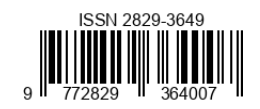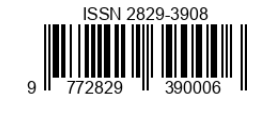Students' Reflective Thinking In Economic Learning
DOI:
https://doi.org/10.56910/literacy.v3i1.1358Keywords:
Reflective thinking, students, learning styles, economic learningAbstract
The inability of students to grasp a concept or solve problems during the learning process is an inevitable occurrence. One such instance is when students encounter challenges in solving economic problems. Addressing the issue of students' inability to analyze questions in economics learning is essential, as every student inherently possesses the potential for analytical problem-solving abilities. This research is a qualitative research project involving high school students in Cirebon Regency as participants. The data collection techniques employed in this research include observation, data analysis, and in-depth interviews. The objective of this research is to investigate how students utilize their reflective thinking abilities in problem-solving within the context of economics learning. In this research, learning styles exert the greatest influence on economics learning in schools. Several factors contribute to students' reluctance to complete economics assignments, including differences in students' learning styles. Some students prefer theoretical learning, while others prefer practical learning. Additionally, obstacles arise from a lack of self-awareness, which hinders reflective thinking. In this research, learning styles emerge as the primary influencer on economics education within schools. Numerous factors contribute to students' reluctance to complete economics assignments, notably variances in their learning styles. While some students gravitate towards theoretical learning, others lean towards practical learning. Moreover, challenges arise from a deficiency in self-awareness, impeding reflective thinking.
References
Al Arood, M. A. S., Aljallad, M. Z., & Baioumy, N. (2020). The effectiveness of a cloud-based learning program in developing reflective thinking skills in Islamic education among students in UAE. International Journal of Education and Practice, 8(1), 158–173. https://doi.org/10.18488/journal.61.2020.81.158.173
Astuti, J. P., Mayangsari, M. D., & Zwagery, R. V. (2019). Hubungan Kesadaran Diri Dengan Flow Akademik Pada Siswa di Daerah Lahan Gambut. Jurnal Kognisia: Jurnal Mahasiswa Psikologi Online, 2(2), 68–74.
Buelow, J. R., Barry, T., & Rich, L. E. (2018). Supporting learning engagement with online students. Online Learning Journal, 22(4), 313–340. https://doi.org/10.24059/olj.v22i4.1384
El-Sabagh, H. A. (2021). Adaptive e-learning environment based on learning styles and its impact on development students’ engagement. International Journal of Educational Technology in Higher Education, 18(1). https://doi.org/10.1186/s41239-021-00289-4
Hegarty, B., & Thompson, M. (2019). a T Eacher ’ S I Nfluence on S Tudent E Ngagement : Journal of Information Technology Education: Research, 18, 113–139.
Jaenudin, J., Nindiasari, H., & Pamungkas, A. S. (2017). Analisis Kemampuan Berpikir Reflektif Matematis Siswa Ditinjau Dari Gaya Belajar. Prima: Jurnal Pendidikan Matematika, 1(1), 69. https://doi.org/10.31000/prima.v1i1.256
Junaedi, Y., Maryam, S., & Anwar, S. (2022). Analisis Kemampuan Berpikir Reflektif Siswa Smp Pada Pembelajaran Daring Di Era Covid-19. Wilangan: Jurnal Inovasi Dan Riset Pendidikan Matematika, 3(1), 34. https://doi.org/10.56704/jirpm.v3i1.14400
Junaedi, Y., Maryam, S., & Lutfi, M. K. (2022). Analisis Kemampuan Berpikir Reflektif Siswa SMP Pada Pembelajaran Daring. Journal of Mathematics Education and Learning, 2(1), 49. https://doi.org/10.19184/jomeal.v2i1.30228
Kholid1, M. N., Sa’dijah2*, C., Hidayanto3, E., & and Hendro Permadi4. (n.d.). How are students’ reflective thinking for problem solving? https://doi.org/https://doi.org/10.17478/jegys.688210
Kunani, K. (2023). Optimalisasi Hasil Belajar: Pembelajaran Kooperatif Jigsaw pada Mata Pelajaran Peminatan Ekonomi MAN 2 Cirebon. Progressive of Cognitive and Ability, 2(4), 424. https://doi.org/10.56855/jpr.v1i4.749
Masturoh, I., & Anggita, N. (2018). PENENERAPAN MODEL PROBLEM BASED LEARNING (PBL) UNTUK MENINGKATKAN HASIL BELAJAR SISWA PADA SUBTEMA PELESTARIAN SUMBER DAYA ALAM INDONESIA. IV.
Muhd Al-Aarifin, I., Anisa, A., Jamilah, A.-M. M., Nik Mohd Rizal, M. F., Mohd Zarawi, M. N., & Mohamad Najib, M. P. (2019). Using Kahoot! as a formative assessment tool in medical education: A phenomenological study. BMC Medical Education, 19(1), 1–8.
Nofrialdi, R. (2022). the Effect of Student’S Creativity and Learning Interest on Learning Achievement in Economic Students Class Xi Ips Sma Ekasakti Padang. Journal International on Global Education, 1(1), 37–46. https://doi.org/10.31933/jige.v1i1.536
Nurzaki Alhafiz. (2022). Analisis Profil Gaya Belajar Siswa Untuk Pembelajaran Berdiferensiasi Di Smp Negeri 23 Pekanbaru. J-ABDI: Jurnal Pengabdian Kepada Masyarakat, 1(8), 1913–1922. https://doi.org/10.53625/jabdi.v1i8.946
Rahmayanti, V. (2016). Pengaruh Minat Belajar Siswa dan Persepsi atas Upaya Guru dalam Memotivasi Belajar Siswa terhadap Prestasi Belajar Bahasa Indonesia Siswa SMP di Depok. SAP (Susunan Artikel Pendidikan), 1(2), 206–216. https://doi.org/10.30998/sap.v1i2.1027
Rijali, A. (2018). Analisis Data Kualitatif Ahmad Rijali UIN Antasari Banjarmasin. 17(33), 81–95.
Sabariego Puig, M., Sánchez Martí, A., & Cano Hila, A. B. (2019). Reflective thinking in higher education: Contributions from narrative methodologies. Revista Complutense de Educacion, 30(3), 813–830. https://doi.org/10.5209/RCED.59048
Samura, A. ode. (2019). Kemampuan Berpikir Kritis dan Kreatif Matematis Melalui Pembelajaran Berbasis Masalah. Journal of Mathematics and Science, 5(1), 20–28.
Sari, A. D., Hastuti, S., & Asmiati, A. (2020). Pengembangan Model Creative Problem Solving (CPS) Untuk Meningkatkan Kemampuan Berpikir Reflektif Siswa. Jurnal Cendekia : Jurnal Pendidikan Matematika, 4(2), 1115–1128. https://doi.org/10.31004/cendekia.v4i2.318
Squicciarini, O. M. P. (2020). Pengabdian dan Pembangunan : Religiusitas , Pendidikan , dan Kemajuan Ekonomi di Prancis Abad Kesembilan Belas †. 110(11), 3454–3491.
Supriyatno, T., Susilawati, S., & Hassan, A. (2020). E-learning development in improving students’ critical thinking ability. Cypriot Journal of Educational Sciences, 15(5), 1099–1106. https://doi.org/10.18844/CJES.V15I5.5173
Undari, M., & Desyandri. (2022). Pandangan Aliran Rekonstruksionisme Terhadap Gaya Belajar Dalam Penerapan Kurikulum Merdeka. Pendas : Jurnal Ilmiah Pendidikan Dasar, 7(2), 1252–1261.
Veine, S., Anderson, M. K., Andersen, N. H., Espenes, T. C., Søyland, T. B., Wallin, P., & Reams, J. (2020). Reflection as a core student learning activity in higher education - Insights from nearly two decades of academic development. International Journal for Academic Development, 25(2), 147–161. https://doi.org/10.1080/1360144X.2019.1659797
Weerakoon, C. (2023). Exploring the synergy of digital competence and photo-driven reflection: A pilot study on reflective thinking skill development in business education. Cogent Education, 10(2). https://doi.org/10.1080/2331186X.2023.2282304
Wijnands, A., Rijt, J. van, & Coppen, P. A. (2021). Learning to think about language step by step: a pedagogical template for the development of cognitive and reflective thinking skills in L1 grammar education. Language Awareness, 30(4), 317–335. https://doi.org/10.1080/09658416.2021.1871911
Zhao, F. (2019). Using quizizz to integrate fun multiplayer activity in the accounting classroom. International Journal of Higher Education, 8(1), 37–43. https://doi.org/10.5430/ijhe.v8n1p37
Al Arood, M. A. S., Aljallad, M. Z., & Baioumy, N. (2020). The effectiveness of a cloud-based learning program in developing reflective thinking skills in Islamic education among students in UAE. International Journal of Education and Practice, 8(1), 158–173. https://doi.org/10.18488/journal.61.2020.81.158.173
Astuti, J. P., Mayangsari, M. D., & Zwagery, R. V. (2019). Hubungan Kesadaran Diri Dengan Flow Akademik Pada Siswa di Daerah Lahan Gambut. Jurnal Kognisia: Jurnal Mahasiswa Psikologi Online, 2(2), 68–74.
Buelow, J. R., Barry, T., & Rich, L. E. (2018). Supporting learning engagement with online students. Online Learning Journal, 22(4), 313–340. https://doi.org/10.24059/olj.v22i4.1384
El-Sabagh, H. A. (2021). Adaptive e-learning environment based on learning styles and its impact on development students’ engagement. International Journal of Educational Technology in Higher Education, 18(1). https://doi.org/10.1186/s41239-021-00289-4
Hegarty, B., & Thompson, M. (2019). a T Eacher ’ S I Nfluence on S Tudent E Ngagement : Journal of Information Technology Education: Research, 18, 113–139.
Jaenudin, J., Nindiasari, H., & Pamungkas, A. S. (2017). Analisis Kemampuan Berpikir Reflektif Matematis Siswa Ditinjau Dari Gaya Belajar. Prima: Jurnal Pendidikan Matematika, 1(1), 69. https://doi.org/10.31000/prima.v1i1.256
Junaedi, Y., Maryam, S., & Anwar, S. (2022). Analisis Kemampuan Berpikir Reflektif Siswa Smp Pada Pembelajaran Daring Di Era Covid-19. Wilangan: Jurnal Inovasi Dan Riset Pendidikan Matematika, 3(1), 34. https://doi.org/10.56704/jirpm.v3i1.14400
Junaedi, Y., Maryam, S., & Lutfi, M. K. (2022). Analisis Kemampuan Berpikir Reflektif Siswa SMP Pada Pembelajaran Daring. Journal of Mathematics Education and Learning, 2(1), 49. https://doi.org/10.19184/jomeal.v2i1.30228
Kholid1, M. N., Sa’dijah2*, C., Hidayanto3, E., & and Hendro Permadi4. (n.d.). How are students’ reflective thinking for problem solving? https://doi.org/https://doi.org/10.17478/jegys.688210
Kunani, K. (2023). Optimalisasi Hasil Belajar: Pembelajaran Kooperatif Jigsaw pada Mata Pelajaran Peminatan Ekonomi MAN 2 Cirebon. Progressive of Cognitive and Ability, 2(4), 424. https://doi.org/10.56855/jpr.v1i4.749
Masturoh, I., & Anggita, N. (2018). PENENERAPAN MODEL PROBLEM BASED LEARNING (PBL) UNTUK MENINGKATKAN HASIL BELAJAR SISWA PADA SUBTEMA PELESTARIAN SUMBER DAYA ALAM INDONESIA. IV.
Muhd Al-Aarifin, I., Anisa, A., Jamilah, A.-M. M., Nik Mohd Rizal, M. F., Mohd Zarawi, M. N., & Mohamad Najib, M. P. (2019). Using Kahoot! as a formative assessment tool in medical education: A phenomenological study. BMC Medical Education, 19(1), 1–8.
Nofrialdi, R. (2022). the Effect of Student’S Creativity and Learning Interest on Learning Achievement in Economic Students Class Xi Ips Sma Ekasakti Padang. Journal International on Global Education, 1(1), 37–46. https://doi.org/10.31933/jige.v1i1.536
Nurzaki Alhafiz. (2022). Analisis Profil Gaya Belajar Siswa Untuk Pembelajaran Berdiferensiasi Di Smp Negeri 23 Pekanbaru. J-ABDI: Jurnal Pengabdian Kepada Masyarakat, 1(8), 1913–1922. https://doi.org/10.53625/jabdi.v1i8.946
Rahmayanti, V. (2016). Pengaruh Minat Belajar Siswa dan Persepsi atas Upaya Guru dalam Memotivasi Belajar Siswa terhadap Prestasi Belajar Bahasa Indonesia Siswa SMP di Depok. SAP (Susunan Artikel Pendidikan), 1(2), 206–216. https://doi.org/10.30998/sap.v1i2.1027
Rijali, A. (2018). Analisis Data Kualitatif Ahmad Rijali UIN Antasari Banjarmasin. 17(33), 81–95.
Sabariego Puig, M., Sánchez Martí, A., & Cano Hila, A. B. (2019). Reflective thinking in higher education: Contributions from narrative methodologies. Revista Complutense de Educacion, 30(3), 813–830. https://doi.org/10.5209/RCED.59048
Samura, A. ode. (2019). Kemampuan Berpikir Kritis dan Kreatif Matematis Melalui Pembelajaran Berbasis Masalah. Journal of Mathematics and Science, 5(1), 20–28.
Sari, A. D., Hastuti, S., & Asmiati, A. (2020). Pengembangan Model Creative Problem Solving (CPS) Untuk Meningkatkan Kemampuan Berpikir Reflektif Siswa. Jurnal Cendekia : Jurnal Pendidikan Matematika, 4(2), 1115–1128. https://doi.org/10.31004/cendekia.v4i2.318
Squicciarini, O. M. P. (2020). Pengabdian dan Pembangunan : Religiusitas , Pendidikan , dan Kemajuan Ekonomi di Prancis Abad Kesembilan Belas †. 110(11), 3454–3491.
Supriyatno, T., Susilawati, S., & Hassan, A. (2020). E-learning development in improving students’ critical thinking ability. Cypriot Journal of Educational Sciences, 15(5), 1099–1106. https://doi.org/10.18844/CJES.V15I5.5173
Undari, M., & Desyandri. (2022). Pandangan Aliran Rekonstruksionisme Terhadap Gaya Belajar Dalam Penerapan Kurikulum Merdeka. Pendas : Jurnal Ilmiah Pendidikan Dasar, 7(2), 1252–1261.
Veine, S., Anderson, M. K., Andersen, N. H., Espenes, T. C., Søyland, T. B., Wallin, P., & Reams, J. (2020). Reflection as a core student learning activity in higher education - Insights from nearly two decades of academic development. International Journal for Academic Development, 25(2), 147–161. https://doi.org/10.1080/1360144X.2019.1659797
Weerakoon, C. (2023). Exploring the synergy of digital competence and photo-driven reflection: A pilot study on reflective thinking skill development in business education. Cogent Education, 10(2). https://doi.org/10.1080/2331186X.2023.2282304
Wijnands, A., Rijt, J. van, & Coppen, P. A. (2021). Learning to think about language step by step: a pedagogical template for the development of cognitive and reflective thinking skills in L1 grammar education. Language Awareness, 30(4), 317–335. https://doi.org/10.1080/09658416.2021.1871911
Zhao, F. (2019). Using quizizz to integrate fun multiplayer activity in the accounting classroom. International Journal of Higher Education, 8(1), 37–43. https://doi.org/10.5430/ijhe.v8n1p37
Downloads
Published
How to Cite
Issue
Section
License
Copyright (c) 2024 LITERACY : International Scientific Journals of Social, Education, Humanities

This work is licensed under a Creative Commons Attribution-ShareAlike 4.0 International License.







